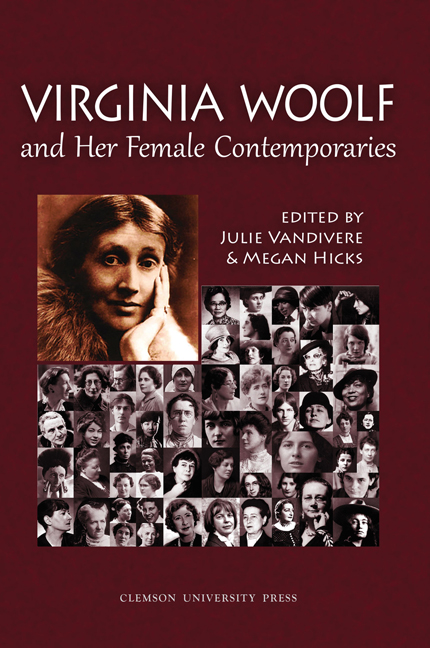Book contents
- Frontmatter
- Table of Contents
- Introduction
- Acknowledgments
- Abbreviations
- Who Are Virginia Woolf's Female Contemporaries?
- Virginia Woolf's Cultural Contexts
- Virginia Woolf and the Book Society Limited
- The Outsider as Editor: Three Guineas and the Feminist Periodical
- Woolf 's Imperialist Cousins: Missionary Vocations of Dorothea and Rosamond Stephen
- Mary Sheepshanks, Virginia Stephen, and Morley College: Learning to Teach, Learning to Write
- Moving Picture This: Virginia Woolf in the British Good Housekeeping!? or Moving Picture This: Woolf 's London Essays and the Cinema
- “Quota Quickies Threaten Audience Intelligence Levels!”: The Power of the Screen in Virginia Woolf 's “The Cinema” and “Middlebrow” and Betty Miller's Farewell Leicester Square
- Virginia Woolf's Contemporaries Abroad
- Virginia Woolf's Contemporaries at Home
- Tribute to Jane Marcus
- Notes on Contributors
- Conference Program 223
Moving Picture This: Virginia Woolf in the British Good Housekeeping!? or Moving Picture This: Woolf 's London Essays and the Cinema
from Virginia Woolf's Cultural Contexts
- Frontmatter
- Table of Contents
- Introduction
- Acknowledgments
- Abbreviations
- Who Are Virginia Woolf's Female Contemporaries?
- Virginia Woolf's Cultural Contexts
- Virginia Woolf and the Book Society Limited
- The Outsider as Editor: Three Guineas and the Feminist Periodical
- Woolf 's Imperialist Cousins: Missionary Vocations of Dorothea and Rosamond Stephen
- Mary Sheepshanks, Virginia Stephen, and Morley College: Learning to Teach, Learning to Write
- Moving Picture This: Virginia Woolf in the British Good Housekeeping!? or Moving Picture This: Woolf 's London Essays and the Cinema
- “Quota Quickies Threaten Audience Intelligence Levels!”: The Power of the Screen in Virginia Woolf 's “The Cinema” and “Middlebrow” and Betty Miller's Farewell Leicester Square
- Virginia Woolf's Contemporaries Abroad
- Virginia Woolf's Contemporaries at Home
- Tribute to Jane Marcus
- Notes on Contributors
- Conference Program 223
Summary
The original context for Virginia Woolf 's London cityscape essays (1931–32) has remained a mystery, particularly for American scholars, as the British Good Housekeeping magazines have been so hard to come by. Curious, we have wondered: How were the essays illustrated? Who did the artwork? What were the other articles, advertisements, and visuals of the magazine like? For me, for a long time, such questions remained unanswered. It was a delight, of course, to read and reread the texts of the essays as they were published in different venues, from the Essays of Virginia Woolf to the many editions of The London Scene—but something was missing. Though Stuart Clarke's endnotes and the scholarly and theoretical studies by Jeanette McVicker, Alice Wood, and Susan Squier proved rewarding—they were also a tease. At long last, I did locate the treasured issues, so I relish the opportunity to share them with an audience of Woolf scholars.
Poring over the magazines, I at first felt overwhelmed with complicated—and at times conflicting—responses. I was charmed, disarmed, and alarmed, all at once, by the barrage of competing claims for my attention. A 1922 editorial, “The Reason for Good Housekeeping,” articulates the multi-faceted goals for the fledgling journal:
The daily life of women—what concerns them and interests them most profoundly and most intimately, what they talk about, think about, and wish to read about in their favourite magazine—will be the first concern of Good Housekeeping.… All sides and phases of women's interest—art, music, and the drama, and the social side of life—will find a place.…Women writers, whose words are waited for and whose views are valued by other women all over the kingdom, will be among our honoured contributors. (qtd. in Braithwaite 11)
Clearly, the magazine hoped to cover an ambitious range: fiction and literature, nonfiction, articles by and about professional women, advertisements, and quirky bits. The fiction is largely on the romantic melodramatic side, and often “To Be Continued.” Nonfiction pieces include articles about women and money, professional women, modern art, British film, women in various industries, and so on. Advertisements are aimed towards the new independent woman as well as the housewife; a car advertisement for the Vauxhall Cadet claims “Gear-changing, ladies? Why, nothing simpler!” One amusing advertisement for Kotex has a woman confiding to another, “My mind is on my driving.”
- Type
- Chapter
- Information
- Virginia Woolf and Her Female Contemporaries , pp. 76 - 85Publisher: Liverpool University PressPrint publication year: 2016



